10:00am-11:30am Washington, D.C.
Speakers: Ambassador Robert A. Seiple (Ret.), Founder and Chairman of the Board, Institute for Global Engagement; co-editor, Religion & Security Colonel Charles P. Borchini, USA (Ret.), Research Fellow, Center for Emerging Threats and Opportunities, USMC
Moderator: Dr. Pauletta Otis, Senior Fellow in Religion & International Affairs, Pew Forum on Religion & Public Life
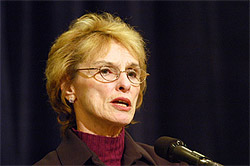
PAULETTA OTIS: Good morning. A very, very warm welcome on a cold morning. And congratulations to all of you with internal GPS systems – you found it! This is very good. Thank you very much for coming. My name is Pauletta Otis, and I’m a senior fellow at the Pew Forum on Religion & Public Life.
The Forum is a non-partisan organization affiliated with the Pew Research Center. We are by mandate non-advocacy, which does not mean we do not treat very controversial, critical, important issues on a daily and monthly basis. So, welcome, and we’ll get started.
This event coincides with the release of Religion and Security: A Nexus in International Security, the volume published by Roman & Littlefield and edited by Ambassador Robert Seiple and Dr. Dennis Hoover. Some of the volume’s contributors are here this morning. We hope that they will be able to make some comments soon – Dr. Bin Bakar, Dr. Johnston, Chris Seiple, Marc Gopin, Josh White, and I hope I haven’t missed anyone.
And I can’t help but notice that this audience is quite remarkable in and of itself. We have members of the armed forces. We have a couple of people who have just returned from Iraq from combat areas where religion and violence and national security issues were critical. We have people from the State Department who work with USAID and on the ground, dealing with health issues, social issues, construction, children, adults and some of the heartaches in the world. We have people here from NGOs who have dedicated their lives, their activities and their professions to working on these issues. We have students who are critically interested in these issues and are planning on dedicating their minds, their bodies and their hearts to the nexus of religion and security.
And although some of you have come for personal reasons – because you are personally concerned about faith and conflict, and the relationship between your own personal belief system and conflict and war and the events that are happening in our world – others of you have come for professional reasons, because you know that whatever you do professionally will be impacted by this nexus of religion and security that seems to be hitting us in a more critical way on a daily basis.
I’m glad you’re interested. It’s a bit of a scary topic. I have two sentences to read to you and that’s all I’m going to read. But this came from a friend who’s a federal district court judge. He writes, “Dear Pauletta, I’m sorry I can’t make the event, but each day it’s looking more and more like we’re going to live out the rest of our lives, and most likely ditto for our kids and grandkids, in that haze of the ultimate oxymoron: religious warfare. It seems like in the past there were hot flashes of conflict followed by decades and centuries of relative non-war version of peace, but I’m thinking the people and groups are now so deeply polarized that it will never just end.”
Indeed, a glimpse of our world shows that religious violence or conflict associated with religion is omnipresent. We look at Africa this morning: we have a tragic situation in the Ivory Coast, and not only there, but in Sudan, and in Chad, and in Uganda and in other areas. South America: Peru, Brazil, Haiti have violence and conflict associated with religion. In Europe we have Spain, Cyprus, and, in this last week, Holland. No one is immune to this. In South Asia we have India and Sri Lanka. In Central Asia, Chris Seiple’s work on Uzbekistan in this volume is an indication of the criticality of religion in that conflict.
We also know that whenever religion is associated with conflict, there’s a higher level of lethality. And the research gives ample evidence that any conflict that has a religious component, the higher that religious component, the more likely it is to be of longer duration, larger scope, higher intensity and higher severity – possibly because religious values are non-negotiable values; they are harder for the peace community and the conflict community to deal with.
We are also acutely aware that the nature of warfare in and of itself has changed. We no longer have conventional warfare where two armies meet on a field, kill each other, and the last man standing declares victory and moral power. The nature of asymmetrical war, non-conventional warfare and urban ops now has changed to such an extent that our military forces are having to change their entire mode of operation, why they’re there and the short- and long-term strategies.
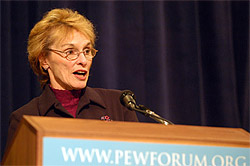
Today will hopefully be only the first of a series of meetings where we can come together as people who are interested personally and professionally in this nexus of conflict and religion, and talk about some of the issues, both generally and specifically, that are confronting our country, our armed forces, and our religious faith systems. We are especially pleased this morning because our guest speakers are two people who have taken this very seriously, who have written, published and spoken publicly about it.
Ambassador Seiple and Colonel Borchini will provide two different perspectives – two that need to be heard and provide a good platform for the rest of us to take on the discussion in question-and-answer format afterwards. Now, Ambassador Seiple may or may not know it, but he’s one of the reasons I’m in Washington, D.C. Got a lot to be accountable for. He may regret this part of it. (Chuckles.) But I heard him speak at the U.S. Naval Academy, back in 1996 maybe, and frankly, I was profoundly affected by his presentation – not necessarily by the facts and the recounting of what we had done and what he thought about things, but that he was willing to take on religion and conflict, and talk about them both in the same presentation.
Ambassador Seiple is founder and chairman of the board for the Institute for Global Engagement. Prior to the founding of IGE, he spent two years in the State Department as the first U.S. Ambassador-at-Large for International Religious Freedom. He spent the previous 11 years as president of World Vision. He served as president of Eastern College and as vice president for development at Brown. And since the Marine birthday is today – okay, guys, hoo-rah, I’m supposed to say – he spent from 1966 to 1969 in the U.S. Marine Corp, flying 300 combat missions in Vietnam, five Battle Stars, a Navy Commendation, 28 Air Metals, Distinguished Flying Cross. And today he’s going to be presenting our first of, I hope, many conversations on the nexus of religion and security. Thank you.
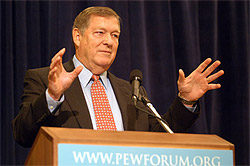
ROBERT SEIPLE: Thank you. (Applause.) It is obviously unnerving to come up to the podium realizing that you’re responsible for the moderator and her presence here. I remember well speaking to the Naval Academy. I’ve never spoken to such a risk-adverse bunch of people in my life and I thought I would just try to loosen them up. I was supposed to be picked up at the State Department by a Navy guy – one of the mid-shipmen – who got lost. And I made the mistake of standing up in front of this gathered throng and saying, “Next time, send a Marine.” (Laughter.) And nobody laughed. (Laughter.) Thank you. This is what you do on the birthday – hoo-rah! – (laughter) – 229 years of history unhampered by progress. We’re glad to be part of all of that.
Thanks to the Pew Forum on Religion & Public Life. Luis, we are glad that you have brought your entourage down here to Washington. It’s always nice to have such a heavily endowed megaphone on these issues. And we’re delighted with what you have done so far and really look forward to your very, very important presence in this town.
And thanks to Pauletta. Pauletta said it more beautifully than I can say it, but let me say, where she is humble, I am not, and Pauletta is really part of that research project that has determined that religious-based conflict is longer, is more brutal, is more destructive, and is less predictable for all these reasons. This is why we come together to have a conversation – so that we can talk about something that in this town has not been talked about easily because religion and politics are things you simply do not discuss in polite company, even though most of the non-NATO world does it differently. So we need to change that.
Let me also offer a word on the co-editor Dennis Hoover who is not here today. You know, if you live long enough, they give you titles and then they give you much more credit than you ever deserve, but this superbly edited book is a tribute to Dennis. Dennis did an absolutely phenomenal job. If you know him, you know he is bright, he’s reflective, he’s religiously reflective. He has a Ph.D. from Oxford and he works for the Institute for Global Engagement. And because of him, we have this collection of essays.
Let me tell you a story by way of sharing some brief thoughts today, all of them designed to provoke you into discussion after the talking has stopped up here. I met a young lady by the name of Mary in Lebanon when I worked with World Vision. Lebanon, as you know, had its own religious civil war in which 140,000 people were killed. Mary was 18 years old at the time that the war spilled over into her village. There was a day when Druze militia entered the village. She was a Christian. By the way, please do not get hung up on categories here. We could put any two categories for any part of the world here, so don’t let the example mess you up.
The Druze militia began shooting up the village. Everybody’s running, trying to get out the way. Mary runs but falls over a root, falls to the ground. Before she can get up, this militiaman, a young man with a pistol, comes up, puts the pistol to her head. Knowing that she is a Christian, he says, “Renounce the cross or die.” Mary, 18 years old, looks back at this young man and says, “I was born a Christian; I will die a Christian.” The revolver explodes in her face, the bullet goes in just to the left of her chin, comes out the base of her neck, but not before it goes right through the spine, and instantly, irreparably, she is a paraplegic. The young militiaman then bends over her with his bayonet, carves a cross on her chest and leaves her for dead.
Now the next day, the Druze militia decided that they were going to occupy that village, and if you’re going to occupy the village you’ve got a problem: you’ve got to bury the people that were killed the day before. They were beginning to bloat, beginning to stink. And so they came to this massive heap of human carnage – over 30 people dead – and in the middle they heard this soft grown. Miraculously, Mary was still alive. Just as miraculously, these folks took her to the local hospital to be repaired and kept alive.
And I’m talking to Mary, sitting across from her, and I said, “Mary, this makes absolutely no sense. These are people who tried to kill you. Why in the world would they take you to the hospital the next day?”
She says, “You know, sometimes bad people are taught to do good things.”
And I said, “Mary, how do you feel about the person who pulled the trigger? Here you are an Arab woman in a land twice occupied at that time – the Israelis in the south, the Syrians every place else – strapped to a wheelchair, held hostage by your own body, designated as a ward to the state for the rest of your life. How do you feel about the guy who pulled the trigger?”
She said, “I have forgiven them.”
“Mary, how in the world could you forgive them?”
“Well, I forgave them because my God forgave me. It’s as simple as that.”
Now let me give you takeaways from that story. The first takeaway is this, something we already know: There are people in the world today who are willing to die for their faith. And just as importantly, and perhaps unfortunately, there are people in the world today who are willing to kill for their religion. And we neglect this issue in the geopolitical equation at our considerable peril.
Second takeaway: Religion practiced at its best has reconciliation as a methodology: “I have forgiven them. This is what I do. God forgave me; I forgive them.” Reconciliation is the most important sustainable solution to any of the problems of the world. By the way, governments don’t do it well because it takes a lot of time. And if your high holy day is the first Tuesday of November, every four years, you may not have time as a government official to get this done. This is why the NGO community, the church community, the religious faith-based community is so important.
Reconciliation: Religion practiced at its best. Miroslav Volf, a Croatian theologian, has this to say: “What has been done for us should be done by us.” What has been done for us should be done by us. All of the major religions at least talk about reconciliation. Most of them have reconciliation as a core value. Religion that gets dumped on for all the negative things that have happened over and over again in the world should be remembered as an instrument of bringing people together. Governments can negotiate contracts; relationships have to be reconciled. And reconciliation becomes important.
Now, that story of Mary is for those of you who see the world through the lens of the moral imperative. Here’s one for the realpolitik folks in our midst. We were in Laos last year – February of last year – and we were asked to do a religious freedom seminar. The first time in the history of the communist state – a religious freedom seminar hosted by the Laos National Front, the implementers in that governmental structure for such things, sponsored by the U.S. Embassy.
I was asked to come and speak first in this daylong series of speeches. I was specifically asked to talk first of all about why this is important to the United States. Why do Americans feel that religious freedom is an issue? And then at the end, why is the international community so up in arms about this? What do the international covenants say about this subject of religious freedom?
The folks who were assembled there were people who were responsible at the grassroots for implementation. They were police chiefs, they were district officials – those kinds of folks. They were the ones you want to be there, and from every province they came there. And a lot of the stuff, quite frankly, they could have cared less about – until I started talking about religious freedom and security, religious freedom and stability.
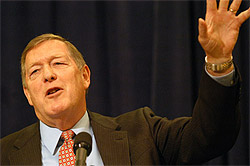
How do you take religious freedom and turn it into something good for folks who worry about their borders, for folks who worry about the ethnicity of the minority groups in their midst? How do you take something that we feel very strongly about and give it to these folks who could probably care less because 70 percent of their people are illiterate, 40 percent live under the poverty line, and frankly, they have bigger problems than the one that we’re trying to impose on them? You have to speak their language. You have to find the point of commonality, vested self-interest. They understood security.
And once you find that someone understands security, then you can begin to talk about a values-based civil society – values such as loyalty. When people are loyal, they are stable. When a government treats its people well, that’s appreciated by the populous; they receive loyalty in return. Moderation, diversity, pluralism, respect: these are the things that are best given to a population to create an environment that is stable and by extension more secure. I spoke to the pragmatics of governance using their own self-interests. If you want stability, if you want security, begin to inculcate in the way you govern these kinds of values that will pay big dividends for what you’re already trying to do.
And by the way, I mentioned respect. Respect is a pragmatic. We have a mantra at the Institute for Global Engagement that goes like this: Understand your own faith at its deepest and richest best. And understand enough about your neighbor’s faith in order to respect it. Understand your own faith deeply, richly – superficiality hurts us in the world; bumper-sticker theology hurts us in the world. Understand why it works, why it’s true, why it works for you, what the eternal verities of that faith really mean in your context and your individual identity.
And at the same time, understand your neighbors in such a way that you will respect how they feel. You’ll respect how they believe. You’ll respect the differences that they bring to the table. I did not use the word “tolerance.” In my way of thinking, tolerance is nothing more than a cheap form of grace applied to people that I don’t really care for. I realize it’s the word in the international covenants, but if I don’t like you, I don’t like you, but I tolerate you out of some sort of political correctness. “Respect” speaks to what we have in common.
You want to do something for homeland security. You don’t know what to do; you’re only one person. This is what you individually do for homeland security: you understand your own faith at its deepest and richest best, and enough about your neighbor’s in order to show it respect. There would never ever be sectarian violence again if we could get everyone in the world to hold onto that.
This is where Osama bin Laden got it all wrong. He put together a truncated gospel – not the best of a faith, but the worst of a religion – a redacted gospel, and had absolutely no respect for anybody else. And a redacted gospel, a truncated gospel in the hands of a despotic, fanatic, religious person is very, very scary. Once again, we forget about the religiosity of the other side at our considerable peril.
Well, we all need both the moral imperative and realpolitik. If I could speak to you biblically, there is a metaphor of the sensitivity of the dove – that’s the human rights crowd, those lovable folks – and the shrewdness of the snake – they’re the realpolitik types. Soft power, hard power – we need both of them. And we need both of them talking to one another. We need the center of power in America, Washington, D.C., consciously putting those groups together like the Pew Forum has done today.
We talk about inter-faith dialogue. Yes, we need that. We talk about intra-faith dialogue; yes, assuredly, we need that. We talk about inter-agency dialogue; hey, we’ve got a problem here. It’s hard to talk about religion in the inter-agency process of Washington. It’s not the politically correct thing to do. After all, we have this separation of church and state. We’ve separated church and state, and the discussion of religion somehow is not supposed to happen in polite company.
Thomas Jefferson and George Washington and James Madison would be aghast. This is how they talked. This is how thought. This is how they wrote. This is how they debated! And somewhere between then and now we have pushed this conversation off the page. On the one hand, we’ve developed good governance in separation of church and state, but we’ve done that at a terrible price. I’m not suggesting we change it; just that we remember, we’ve done that at the price of good analysis.
We don’t think we can talk about religion in a geopolitical context even if the first war of the 21st century is a religious war. And you may not think that way, but we’ve got to get used to talking about this because our enemy thinks that way. And we need to know how our enemy thinks and how our enemy is motivated, why he did what he did and what he might be planning in the future.
I’m delighted that Doug Johnston has arrived. We can hardly start one of these discussions without Doug here. Doug fired the first commonsensical shot across the bow of this issue when he came out with that marvelous edited copy of Religion: The Missing Dimension of Statecraft. That was a prophetic piece, which is to say that it came out before 9/11. Religion – reconciliation that comes out of the best of our faith – the missing dimension of statecraft.
Folks, this is the second shot across the bow – religion and security – and we are hopeful that starting today and onward, this subject will get the attention it deserves. Thank you. (Applause.)
DR. OTIS: What a great start. Thank you very much.
Our second speaker is Colonel Charley Borchini – Charles Borchini, sorry – do I get too personal here? Charley Borchini is retired from the U.S. Army Special Forces, where he spent most of his career as a PSYOPS officer – or Psychological Operations Officer to the acronym-challenged – where understanding culture and religion is an integral part of the job. Colonel Borchini currently works at CETO, the Center for Emerging Threats and Opportunities, at Quantico, and holds the title of a research fellow.
Now, I’ve worked with Colonel Borchini on several projects including the “Flashpoint” study for the U.S. Marine Corps that attempted to figure out just when and where the emerging conflicts would be in the next 10 years, where the U.S. Marine Corps may be called on to serve in the next 10 years. During the period of this work, I came to respect Borchini’s insight and understanding of the nexus between religion, culture and military requirements. And at this time we look forward to hearing his thoughts on this subject. Thank you. (Applause.)
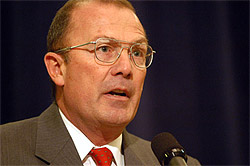
COLONEL CHARLES P. BORCHINI: All right, Pauletta, this is another fine mess you’ve gotten me into. (Laughter.) Hard to follow such a tremendous speaker there, the ambassador.
These are my comments. They don’t reflect the Army or the company that I worked for, and I apologize in advance if I offend anyone.
First of all, I’d like to thank Dr. Otis and the Pew Forum on Religion & Public Life for inviting me to participate today. After 9/11, Dr. Otis volunteered to participate in several cultural intelligence seminars – that’s what the Marines call them – in the United States and overseas. She spoke about religious violence, one of her many areas of expertise. She should be the one who’s speaking here today, not me. I’m just an old soldier.
I can’t start without saying how interesting I found Ambassador Seiple’s talk. I was very impressed with his talk, but I was really impressed with his bio portion that talked about his service in World Vision and all the efforts they do around the world – tremendous, tremendous organization. He hasn’t sat idly and watched history pass him by, but he’s been a player in it all along. So thank you for your service.
The work he did, though, in the State Department, with regards to advocating religious freedom, continues today. This past September, the State Department released its annual report on religious freedom, and unfortunately, as in previous years, it makes it clear that too many people around the world are still denied their basic religious liberty. It says, quote, “While some suffer under totalitarian regimes, others are subjugated to governments that deliberately target or fail to protect religious minorities from discrimination and violence.”
On a similar note, yesterday I was doing some research and I saw an article in the Harvard University Gazette – surprised I actually read something like that? – and a professor at the Kennedy School of Government questioned the long-held belief that terrorism stems from poverty. That’s what everyone says – “Oh, the terrorists, they have no hope for the future because they don’t have economic opportunities.” Well, he found that instead, terrorist violence is related to a nation’s level of political freedom. So it’s something this group should think about when it’s considering religion and national security.
From a military perspective, I think the State Department’s report should help shape the mindset of the service men and women in the active military, the National Guard, the Reserves, to help them prepare for the challenges they’re going to face in the 21st century. September 11th has helped us come out of the closet with regards to looking at religion, and we can no longer ignore the role religion plays in our lives as well as in the lives of the people with whom we interface.
We have to recognize that our own commitment – and the ambassador talked a little bit about understanding ourselves – that our commitment to religious liberty is older than our nation itself. It directly influenced how we became a nation, when the first settlers fled old Europe and headed to the New World looking for an opportunity to freely practice their religion. Our embrace and acceptance of different religious practices has become a central part of our expansion from 13 colonies to 50 states across the vast continent.
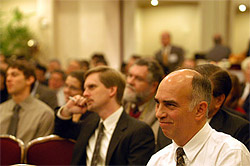
Combined with our geography and the different peoples who settled here, religion has played a key role in molding us all the way to where we are today. And I don’t think anyone would disagree that religion – this religious heritage of ours – and diversity are even more important in today’s post-9/11 and post-Saddam world.
But despite our promise of religious freedom and hope for a better way of life, our umbrella of protection to friends and allies and the oppressed around the world, much of the world is polarized against us. Some may disagree with the positions we’ve taken with regards to global issues – the Kyoto Accords on climate change, the International Criminal Court. Some say it’s about our spread of our decadent culture, our values and morals.
And finally, for some, it is about religion, and we need to recognize this. Today, obviously, some of the greatest threats to our nation’s security and international peace define and even justify violence in religious terms. Just look back in the last couple years that I was in the Army: the world waited too long to stop the genocide in Bosnia-Herzegovina in the early- to mid-’90s. It did take strong steps to intercede earlier and stop the slaughter of innocent Kosovar Albanians in the first half of 1999. And the world was again much more prepared and willing to respond to a similar situation in East Timor later that same year.
Each of these three cases had strong religious undertones as the basis for conflict. In two of the three, Muslims were victims, and in the third, they were the protagonists. The Israeli-Palestinian issue is touted as one of the primary reasons so many people around the world dislike us. We’re blamed for always taking Israel’s side, for failing to exert our influence over Israel, for not standing up for the Palestinians.
On one hand, we see the Palestinian suicide bombers or those who volunteer for martyrdom operations (as they prefer to be called) who are promised a fantastic reward in the afterlife for killing innocent Israelis. On the other, we see the Israeli military responding by destroying the homes of suicide bombers, assassinating terrorist group leaders, as well as religious leaders who preach violence against Israel, all the while disregarding the collateral damage and the toll on innocent civilians.
Now, I’d like to take a brief moment here to interject a personal comment concerning one of those fantastic promises made to suicide bombers or those who die in martyrdom operations against infidels, and that’s the promise of the 72 virgins waiting for them in heaven. Well, for the life of me, I can’t see the thugs that our Marines and soldiers are fighting in Fallujah ever going to heaven, let alone meeting up with 72 virgins. And it’s especially appropriate that I mention this today on the 229th birthday of the Marine Corps.
If you’re familiar with the hymn, the third verse of the hymn reads, “Here’s health to you and to our corps, which we are proud to serve. In many a strife, we fought for life and never lost our nerve.” If the Army and the Navy ever look on heaven’s scenes, they will find the streets are guarded by United States Marines. So with Marines guarding the streets of heaven, do you think there could be any chance whatsoever that 72 virgins would be waiting for anyone? (Laughter.)
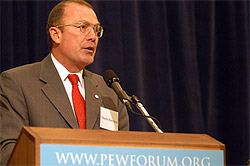
I don’t think that anyone would disagree that religion is wrapped all around the Israeli-Palestinian issue, and we’re caught right smack in the middle of it. But I don’t think religion is the basis for that conflict. As far as I’m concerned, the issue and religion in general are exploited by everyone on all sides – from the Palestinian leadership, which is torn between accommodation and conflict with Israel, to the Israeli government, which is trying to balance its security needs with recognition of a Palestinian state, to authoritarian Islamic states in the region who use religion to justify their grip on power and refusal to grant freedom to their citizens, to religious leaders who advocate violent jihad against Israel and the great Satan in the name of their religion, to terrorist groups.
Now, I know I would upset the good Dr. Otis if I didn’t mention that there are plenty of other religious groups out there who advocate religious-based violence. For example, there are Jewish militants that are the flip side of a Saudi Wahhabi coin. These various groups think it is as much their religious duty to kill those with different religious beliefs as al Qaeda feels it is their duty to kill us. But I don’t have the expertise to address that, so I’ll leave that to you, Pauletta.
But we need to put things in proper perspective. For the past 25 years, our nation has been under attack by those who use Islam as a justification for violence. Some of the attacks were sponsored by states while others were committed by terrorist groups. For just a few, I’d like to refresh you memory. The taking of the American Embassy in Tehran and the holding of our diplomats hostage by Iranian students in 1979; the bombing of the American Embassy and Marine Corps barracks in Beirut, Lebanon, in 1983 by Iranian-backed militants who later became Hezbollah; the blowing up of Pan Am Flight 103 over Lockerbie, Scotland, by Libyan agents in 1988; the first World Trade Center bombing in ’93 by the blind Egyptian cleric Omar Abdel-Rahman and Ramzi Yousef; the bombing of the Khobar Towers military housing in Dhahran possibly by Iranian agents in ’96; and then the African embassy bombings in ’98; the bombing of the USS Cole in 2000; and 9/11 by al Qaeda.
Obviously not all Islamic states sponsor terrorism – very few do. Neither are all Muslims terrorists. We need to make sure the world understands that. The overwhelming vast majority of Muslims are peaceful citizens of their countries. But like many Americans and a lot of people around the world, I wish that the majority of those peaceful Muslims would do something, would stand up and be heard. I wish they could do something to overcome their repressive governments to stop the terrorist groups.
Some seem to accept and tolerate and almost welcome the barbarous acts that we see – the beheadings, the execution-style murders. Some Muslims even promote the killings. Just look at the fatwa issued last Friday against America by 26 renowned clerics in Saudi Arabia. Two of them were mentioned by Osama bin Laden in his first jihad against the United States. Five of them are currently professors in a Saudi university that has an affiliate university in northern Virginia.
Let’s hear what they said: “Fighting the occupiers is a duty for those who have the ability. They must be fought until they are evicted and humbled. And it is prohibited for any Muslim to give aid or support to military operations by occupation soldiers.” Such a peace-loving bunch of religious leaders? Give me a break. I just wish our Marines and soldiers would run into them in Fallujah today.
The term I use to describe the enemy we’re facing today is militant radical Islam. It is a very small minority fringe element that combines two ideologies wrapped in Islam to justify terrorism. But it is a very lethal enemy, and as President Bush has said, as John Kerry said, they are intent on using nuclear weapons against our society and we cannot forget that. Militant Islam is any form of the religion that advocates use of armed force and violence to accomplish religious, political and economic objectives.
Radical Islam, on the other hand, is an extreme exclusionary interpretation of Islam that promotes an aggressively intolerant worldview and sympathy with militant Islamic groups. Many who believe in this ideology are convinced that their religion demands the death and destruction of anything that obstructs the achievement of their end goal – whatever that might be – an Islamic world governed by Sharia law, perhaps.
Now, hoping that the moderate mainstream of peace-loving Muslims do something about terrorism may sound like an impossible task, but I don’t think it is. I don’t think it’s out of the question. And in reality, they’re the only ones who can overcome this threat. Now, I’d like to take a look at a couple examples. I’d like to look at Serbia as a case study here.
Throughout the ’80s and ’90s, the Kosovar Albanians were vying for increased freedom from a repressive Serb government. Kosovar Albanians were predominantly Muslim while the rest of Serbia was mostly Christian. Tensions continued to ebb and flow throughout those decades until they reached a crisis level in 1999. The Serb government refused to negotiate a peaceful solution to the problem with the world community, and they began a systematic pogrom against the Kosovar Albanians. Some would say the genocide that led up to the NATO air campaign was based strictly on religious grounds with religious hatred between the Serbs and the Kosovar Albanians dating back hundreds of years.
During that 77-day NATO air campaign, the citizens of Serbia proper rallied around their leader, Slobodan Milosevic. Even though they disliked him – they knew he was corrupt, he used Gestapo-like tactics to enforce the law, terrible governance – they still rallied around him. Remember the people on the bridges in Baghdad telling NATO, go ahead, bomb us? In the first election, though, that was held after the air campaign ended – approximately a year after the air campaign – what did the people do? They voted Milosevic out office. And shortly thereafter, they sent him packing to The Hague, where he’s on trial still today for war crimes and genocide.
What I drew from that war is that it really wasn’t about religion, it was about power. Religion played a key role fueling the emotions of both the Serbs and the Kosovar Albanians. But the conflict was about power; who had it, what he did with it, who wanted it. Religion was the lightening rod.
Similar type of people power was waged successfully in the Philippines in the mid-1980s. Remember when the Filipino people voted out of office their long-time president, strongman Ferdinand Marcos? I believe something like this could happen in the Middle East. People have to have the motivation to do the right thing, the fearlessness to speak out and act in the hope that they can change things for the better. And religion could play a huge role in enabling them.
Now as the sole superpower, I believe the U.S. has an obligation to step in and use its power to help oppressed people. But when we do this, the minute we do it we also need to recognize that people are going to rally around their leader, just like they did in Serbia. We saw this same rally-around-the-leader phenomenon happen in Somalia in 1993 when the United Nations put a bounty on the head of warlord Mohamed Farrah Aidid.
The same thing is happening today in the Middle East. Osama bin Laden is a hero, claiming that the U.S. is attacking Islam and Iraq, and in Afghanistan, and elsewhere around the world. This rally is fueled by the media, especially satellite television and the Internet. It’s also fueled by religion.
I believe that the key to winning the global war on terrorism and to avoiding this rally-around-the leader phenomenon is to develop and fight a two-front strategy, a strategy that uses all of our elements of power – political, economic, informational, military – in a nuanced, choreographed symphony. On one front, we need to ruthlessly apply our kinetic energy resources to capture and kill as many of the enemy as possible, show them we’re the biggest, baddest, most fearsome force in the world who will stop at nothing to accomplish our mission. Hopefully the Bush reelection and the battle at Fallujah is sending that message today around the world. At the same time, we’ll be sending as many of them as possible to their graves.
On the other front, we need to target leaders indirectly. We need to focus on their behavior, exploit their vulnerabilities; specifically, try to separate them from the people that follow them, and cause their internal support base to collapse. We need to expose them for what they are, what they’ve done, and we need the silent majority of people to start speaking out against them. In the case of the Islamic terrorists, we need to focus on the atrocities they commit in the name of religion, how they’ve hijacked the religion and how their actions are those of evil doers.
Now, we must take this two-front war on the offensive well beyond the Middle East. We need to go all around the world. We must fight militant, radical Islam on the fringes – from Africa to Southeast Asia, Central and South America, and Eastern Europe.
People believe religion is important, but it really doesn’t matter whether it’s Judaism, Christianity, Islam, Buddhism, Hinduism or something else. We just need to be cognizant of it and recognize it, and we need to leverage it. In today’s post-9/11, post-Saddam world, small wars or regular warfare, counterinsurgencies, complex contingencies, peace operations and others – all those things we in the military call military operations other than war – these things have become the norm. They are at least as dangerous as what we used to call conventional or traditional warfare. They are often longer in duration, involve state and non-traditional actors, and require very close integration with all the elements of power.
In this environment our military becomes more than just the defender of our nation, its citizens and our way of life. More than anything else, our armed forces become the primary spokesmen and women who represent America and all it stands for around the world in the 100-plus countries in which they are deployed today. They truly are our ambassadors in uniform, and in that role, with that responsibility, they must be familiar with religion as it affects the people with whom they are interacting. They must understand how religion shapes cultures and customs, histories, attitudes, perceptions and behaviors. They must be sensitive to it, but not afraid to use it to help accomplish their mission.
And I’d just like to wrap up by saying that for over a decade now the U.S. has been involved, conducting operations other than war, in places like Somalia, Haiti, Bosnia, East Timor, Kosovo, Afghanistan and Iraq. In every one of these countries, religion has played a significant part of the people’s motivations, intents, capabilities and goals.
It’s increasingly apparent that religion is a critical factor in contemporary warfare, but religion itself is not the problem. In most places at most times for most people, religion provides something that gives them guidance and rationality and reason. But when it assumes a more active role in conflicts – as Pauletta and the ambassador said – the conflict becomes much, much more dangerous.
So I’d like to wrap up here and turn it over to Dr. Otis. Thank you very much.
(Applause.)
DR. OTIS: Since I know probably 30 or 40 percent of you and I know that this audience represents a diverse background religiously, professionally, personally, gender, age, whatever, this is your chance both to ask questions of our panel speakers and to make comments or suggestions or commentary on this topic.
Who would like to be first? And since I do know some of you, if you don’t volunteer – Dr. Gopin and Dr. Johnston and Dr. Bakar and Chris Seiple and Josh White – I’ll call on you, okay? Please. Who would like to be first?
Please. Would you identify yourself, please, and stand up so we can hear you?
STEVE ELLIOTT: I’m Steve Elliott with the Council for America’s First Freedom, and I would just like – I wonder if it would be appropriate to ask Ambassador Seiple to comment on Colonel Borchini’s remarks. (Laughter.)
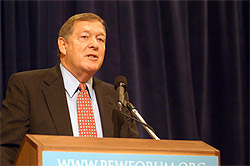
DR. SEIPLE: A Marine? Commenting on an Army guy? Those who are just a little lower than the angels?
This is what happened at the Naval Academy. It was a really great line and no one got it. (Laughter.)
I had a couple of thoughts and feelings, and I know that the Colonel caveated virtually all of his comments with some phrases like “this is a small minority,” “these are the extremists” and “it’s not true of all Muslims.” Yet I think if I were a Muslim I might be a little bit nervous.
We make a big mistake in this country – it’s what we do, but it’s a huge mistake – when we ascribe some sort of monolithic aspect to a faith. If we had two Baptists in the room, we’d have three opinions – so why in the world do we think 1.2 billion Muslims or more would be somewhat monolithically put together? And again, all of the comments were there to caveat that, but let me just take it one step further to make sure you heard what I think the colonel was saying in terms of just a very small, radical, extremist group.
Once we begin to categorize, we have put something in motion that we can stereotype. Once we begin to stereotype, we have put something in motion that we can demonize. Once we demonize, we can figure out how to hate. And once we hate, we can get into violence. And that negative spiral comes out of an unnuanced understanding of faith communities. I came out of the Christian community but, you know, we do this all the time, and our leaders – leaders of the faith, people that you would know, TV personalities, et cetera, et cetera – many times have let us down because they’ve given us the short form, and they’ve given us the proof text and the Cliffs Notes, and it’s a whole lot deeper than that.
So I would, first of all, I think, say exactly what the colonel would say, but just in case you didn’t hear it – I mentioned nuance and Charles mentioned nuance, and the Marine Corps used to have a saying, and probably still does – “When in doubt, attack simultaneously on all fronts.” I happen to like that philosophy. But we are not a country and a people of nuance. If we were, we’d be a much more honest broker in the Middle East. If we were, we’d understand how to do peace as well as we do war. If we were, we would have more than four people from the Muslim faith in the main State Department building here in Washington, D.C. We don’t know how to do nuance well.
And along with that, another comment that just kind of jumps out – the irony of this country that has so many resources and yet is so insulated; that has access to all the data and all the documentaries, and all the analysis, and all the strategies of the world – it is incumbent upon Americans to understand that world that provides the context for this kind of religious suffering. And we haven’t quite gotten there yet.
You know, there are 600 million people of faith being persecuted in the world today. Most of us in this world could not name a single one. And I think if we have the ability to create shock and awe, awesome power in the world – and I’m for that when it’s needed; I’m for maximum fire power or point of attack when it’s needed – but if we have the ability to do that, it is incumbent upon us to also understand our world better in which that awesome power is being made manifest. And you can’t do that in the middle of a war very well. I mean, we forget who threw the first stone in the Middle East. Too much has gone over the bridge, over the dam or whatever, and we don’t remember any longer how it all started.
So again, I think we would be saying the same thing, but since you used the word “nuanced,” I’d simply say that we are a long way from being nuanced as Americans. We don’t listen well, we don’t hear well, we’re triumphalist. Our tone discourages people, turns people off. We wonder why they don’t like us. Well, they don’t like us because we have these wonderful values and we have these interests over here, and the values and the interests don’t always get together. We’re inconsistent and the Achilles’ heel of human rights is inconsistency. But we are powerful enough to get away with it. That’s why they don’t like us.
DR. OTIS: Colonel Borchini, would you like to respond?
COL. BORCHINI: Ah, no, let’s go on.
DR. OTIS: Okay, continue. More than an audience; a participating group, please. Yes, ma’am.
AMAL MOURAD: My name is Amal Mourad. I’m currently unaffiliated. I’m a Muslim. I came in the room as Mr. Borchini started to speak, and as a Muslim I became tense. The reason I became tense is because, in a few sentences, I heard about wanting to kill some of the religious leaders in some kind of context. I know he had a more logical explanation, but that’s what I heard. Asking Muslims to overthrow their governments without speaking about what kind of governments, in what way, what would happen. And I heard a lot of speaking about fighting them everywhere and killing them and so on.
Why I would feel tense through that kind of thing, it is not because I believe that the extremist violence minority is something I would be worried about fighting. As a matter of fact, I come from a country – Egypt – that has been in the fight against extremist terrorist elements within our society for a long time, and have been calling on the international community to help in that fight as a global phenomenon for a long time. So it is definitely something that Egyptians have been living with and have been going through for a long time.
The main reason is that the message that comes out of that is a sense of disruption and more violence, and in many ways unnuanced violence in the sense that we see Muslims as either extremists or a silent majority. Which means I would not know where I would fit in that disruptive game plan in which maybe I’m not included as a Muslim and as an Arab. And therefore, I would be worried that maybe what is in the plan in such a policy is something that would undermine my society rather than do something positive for that society.
In my view, for the United States to help in the Muslim world in the war against terrorism, there needs to be an isolation of the violent elements to do that, and a parallel effort to cooperate with people that are the vast majority. To cooperate with people it’s not enough to ask them to cooperate with you; you’ve got to listen to what they want from you, and in creating a partnership in this fight against the extremist minority, why it would be more beneficial for them to join. You have to accept their understanding of what should be the game plan – who should we fight and how should we fight it, what are the things that we expect from the United States, if they can be a reliable partner.
Sorry for taking so long, but I think that the message is clear.
DR. OTIS: Oh, no, thank you very much. No, we are very glad for your voice and your participation. Would someone like to comment?
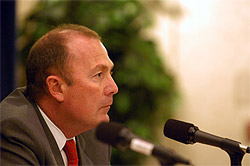
COL. BORCHINI: Yeah, I think I agree with just about everything you said. I think there are a lot of ways the United States can use its national powers to work with other countries. We need to stand up for what we believe in as our values. We probably haven’t done a very good job with that, and we need to do a better job figuring out what our values are and make sure our government does a better job speaking them.
I don’t see Brittany Spears or Madonna as speaking for my personal values, frankly. And I think that’s what most of the rest of the world sees. When they think of America, they see our movie stars, Michael Moore.
America needs to do a better job, and we are doing a terrible job communicating who we are around the world. We need to do a much better job in figuring out how to leverage this modern information age that we’re in to try to reach out and communicate – and not only communicate, but then do positive things. You know, as an average American I think, gee, America. Why did they attack us on 9/11? We’re doing all these great things around the world, helping poor people. I mean, that I think is what the average American thinks, and it’s obviously very different depending on where you sit around the world.
We need to do much more than we’re doing today around the world. If you think about the billions of dollars we’re spending in Iraq today, and if we could just skim a little bit of that off the top and just use it to send military medical teams or engineering teams into poor countries in Africa, for example, we could do an awful lot of good, and we need to do more of that around the world.
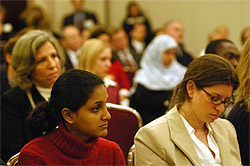
But at the same time, I would just go back to the fact that, since our country was attacked as it was, and there are great threats to attack us more severely, we need to do everything within our power to defend ourselves. Part of that will be our military might, but a bigger part of that is our soft power and all the influence that we can leverage to work with positive countries to encourage positive change in countries that are repressive. You know, I think, gee, we want to promote democracy, I guess; that’s what the president says. But if there was an election today in Saudi Arabia between Osama bin Laden and Prince – the heir – who would win? Do we really want democracy in some countries? I’m not sure, but it’s not our business to call that. It’s that country’s business to call that. It’s our job to work together to help promote human rights and freedom – and religious freedom is one of those freedoms.
So we need to do a better job promoting what our values are, and we still need to make sure we leverage our military might when it comes to defending who we are, and we need to go after the threat. We need to know what the threat is, and clearly we don’t want to scare innocent people away from us. We want to encourage people to stand up and do the right thing, from their perspective as well as ours. So there are some things that we can learn from what you say.
DR. OTIS: Thank you. Next, please?
MARC GOPIN: I’m Marc Gopin, from George Mason University. I have two issues that I’d just like to ask you about.
I fully support the idea of people in uniform being better trained in world religions and being representatives, but I don’t understand how they could be ambassadors in uniform when the ambassadors of the United States have become utterly impoverished and all the funds have gone towards the military machine. In other words, our principal presence around the world now is our capacity to destroy and kill because of the budgets and the way in which we’ve decided to enrich and focus on a Pentagon approach to the world as opposed to a State Department approach to the world, or even NGOs that have expertise in conflict resolution, in diplomacy, in relationships between cultures.
So it’s not as if Marines shouldn’t be trained in this – it’s fabulous if they will be – but what I see is that it’s impossible for somebody who is trained to kill and destroy, and for that to be his principal expertise, to end up being the ambassador for an entire civilization without that becoming a Judeo-Christian assault on another part of the world. I’m just trying to understand how – when we’re no longer number one in literacy, we’re no longer anywhere near the top in terms of foreign aid to people who are poor, but we’re far ahead of everyone else ten times over in terms of military power – how this can lead to a result where people really understand the civilization and appreciate it. And that’s what I’m concerned about in terms of the discussion and where we’re going to go in this clash of civilizations.
I just don’t see how, for example, if the United States had a minority here that were blowing up buildings around the world and the Organization of Islamic States sent a contingent here to find them and destroy them, all the Christian militias and all the things that would rise up to try and fight them on the streets would become American forces fighting an occupier. And it’s just that this is all perception. There’s no way not to see American soldiers around the world as Judeo-Christian soldiers by civilizations that feel under assault. They’re going to side too much with their terrorists because of that clash and because this is the only way in which they see an American face.
You are right that part of this is persuasion. Part of this is making people know who we are and what we really believe, but part of it is where we put our primary funds, and I’d like to just raise the question of what is going to be the future of the principal bulk of America’s incredible GDP – you know, whether it’s going to actually go towards the healing of civilizations rather than a clash of civilizations.
DR. OTIS: Can we take a deep breath before we ask for the second question?
DR. SEIPLE: Can I say something just briefly, Pauletta?
DR. OTIS: Of course. Yes, I’d like to have both respondents answer the question briefly, please.
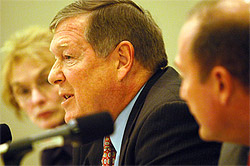
DR. SEIPLE: Well, I spent time in the State Department so I’m high on the diplomatic approach, but let me say something on behalf of the military. What I saw coming out of the Pentagon when I was in the State Department was so good, so clear, so professional, so first-on-the-ground, that the rest of us looked like we couldn’t get our act together. And many times the military was there kind of waiting for the rest of government to come on board.
I guess I see individuals as opposed to categories or neo-cons or five-sided buildings or whatever. But I don’t see the military as starkly as you do, Marc, even though there’s a war going on and it’s graphic – something, by the way, that 40 years ago we didn’t have to worry about. But now the pictures come and fires do not burn themselves out on the back 40 – CNN is there. So we have these instant pictures coming and we see the war and all of its ravages.
But remember this: the media lingers ever so slightly over good news. You lead with blood – if you’re writing columns, if you’re trying to figure out who has got the first page, who is above the fold. And so a lot of the good things that are done because the military is there never get reported on.
We could not distribute food in the Sudan in the late ’80s, early ’90s if we did not have corridors of peace. You cannot do reconciliation until someone forces both sides to lay down their stones. I think of the woman taken in adultery, brought before Jesus. He was asked to mediate a dispute between the Jews and the Romans, and his mediation skills were absolutely perfect; he did nothing but doodle in the sand. And then he was asked to participate in conflict resolution, which he did by having the people lay down their stones. And then he won the heart of the woman who was taken in sin and became the reconciler.
Somewhere in that process there is a role for the military – an absolutely essential role. I know you cannot throw bread at moving refugee populations when they are dodging bullets, and at some point, whether it’s the Lord’s Resistance Army in southern Sudan, northern Uganda, or whether it’s the Hutus following the night of massacre, something has to happen with hard power to bring the sides to a place where all the other good things that should be following in train and be there before them. And by the way, the good NGOs are always there before the military and stay long after they leave. And it has only been recently, by the way, that the American military has absorbed more casualties than the NGO community.
But I tell you when we were distributing food in Baidoa – after all, the bad guys were pushed out of Mogadishu because Colin Powell could only land in one place at one time – we were sure glad when those Marines got there because they allowed us to do our soft power thing much more effectively. And they provided the kind of security – short-term – that hopefully allowed us to provide security long-term, the second front, the justice front.
COL. BORCHINI: I’ll just be really brief. I really disagreed with some of what you said, sir, but the military are our diplomats in uniform. They are the face of what most people around the world see when they see Americans. It’s different than when the Brits had their empire. They had the man on the street who lived in the country, knew the language, married, lived there his whole life; we don’t have very many academics when compared to what the Brits had. Our young students in the States – they would rather stay here and be a business entrepreneur than go to some hellhole around the world where it’s tough.
Our soldiers and Marines go everywhere around the world. I don’t know how many hundred countries they’re in today, but they’re doing a lot more than just fighting and chasing down the bad guys. They’re doing those human things that are so important to build barns and bridges – from the engineering projects to the medical projects.
I remember traveling to Laos. I remember visiting and watching what the Thais did in their rural areas. With just a little bit of money you could do an awful lot of good things. I remember in the late ’90s we had the project to help train and build up an African military force, and part of that was training them in democracy so that they could do a better job within their own countries in terms of human rights.
So there’s a lot of good things we can do with our soft power, but the reality is that it’s our military that’s out on the street for the most part.
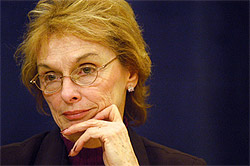
DR. OTIS: Is there someone in uniform – or not in uniform – who has just come back from Iraq who would like to respond to that personally, as having been there? (Pause.)
I don’t want – I mean, unofficially? Well, that’s okay. Maybe we’ll hear from someone later.
In the back row, please.
CHRISTINE TOLBERT NORMAN: My name is Christine Tolbert Norman, and I am from Liberia, West Africa. I am blessed to be here today, and I was blessed to hear Dr. Seiple talk about religious freedom. I think religion is a basic human need, and all people, wherever they live, have a need to relate to God and to people, and to have religious freedom. If America would want to have the kind of security they desire, then I think they need to understand religious freedom and perpetuate it as one great way that you can succeed in your fight.
I could go on, but when my dad, President William R. Tolbert, Jr., was killed in Liberia, I learned that the justification was because of oppression, and the opposition was trained and encouraged to overthrow what we call an oppressive government. And I wonder whether people understand government or understand society if you don’t get a chance to know it. Liberia was founded by freed slaves from America who went to Liberia and established that place for blacks to have a chance to express themselves freely, and America never recognized Liberia for 25 years, and I think American doesn’t know Liberia today. And I think if America will succeed in a war for security in this way you have to understand society, get to understand that you have – as you said, you have the resources to understand, to learn, but I’ve visited many schools and churches and asked black Americans and white Americans if they know the history of Liberia, and they have no knowledge about even the simple fact that Liberia was established by freed black Americans from this country in 1822 and that the nephew of the president – your first president, George Washington – was the president and founder of the American Colonization Society and Francis Scott Key was on that committee.
But I just went through that little history to say that people in America need to get to know simple truths and facts, and I am surprised that America has no interest in Liberia because of this relationship. And when a country, a government, is overthrown because it’s “oppressive,” I wonder if people understand what is an oppressive government when you just say, “I’m going to go and overthrow a government because it is oppressive,” without knowing the dynamics of that society and not even knowing the facts of the history of a society, I think to obtain security, you have to get to know people and know cultures. But I think religion and religious freedom would go very well and reconciliation would go very well in helping the security of America.
I have so much to say, but I am now – when my dad was killed I was hurt, I was confused. Now because I’ve served the Lord and he healed me, I am able to share with my people that we do not need to fight. Two wrongs will never make a right. If you go to overthrow governments because you want to bring in a better system, you create a system where people begin to fight and kill and you never know how far that will reach and where it could even reach in other countries. Right now because of that system, there is so much happening in Africa today. But I’m blessed to hear that there is a need for religious freedom, and I think that’s the way to go.
DR. OTIS: Thank you very much.
Front row, please?
LESLIE KIPLING: My name is Leslie Kipling and I’m a student at American University, and I’m also a veteran, and I served in Iraq the first year of the war. And my question is for Mr. Borchini. You spoke about the need to target local leaders and cause the internal support base to collapse.
When we first entered Iraq, we made an effort to work with all the local clerics and local police and stuff like that. I’m just wondering if you have any sort of assessment of how well that works and what can be done now to continue to do that effort to stop the violence in Iraq.
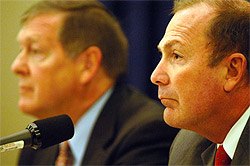
COL. BORCHINI: Thank you for your service to the country. In the past, in my own experience, it worked in Somalia, it worked in the Balkans. Today what we’re seeing in Iraq and to a limited degree in Afghanistan is that people who do cooperate with the U.S. and the coalition are being targeted by the militant radicals and are therefore scared to cooperate.
I think what we need to do is leverage religion. We did this in Somalia. I was in Mogadishu when we first sent the Marines up to Baidoa, and we found – like you said you found when you were in the first Gulf War – we found religious leaders who are key communicators who have a lot of influence, and we got them on the radio and in the newspaper to communicate with their people to say, “Hey, here’s what the U.S. is trying to do here. Please cooperate.” Use these people, in their own words, in their own ways, to try to build a coalition of support with the people who we’re trying to serve.
It’s scary seeing all the people who are being killed. It’s almost like the elite within Iraq, the people who will run Iraq, are being targeted by this group of people. And so it’s easy for me to say, “Well, get up and say something, do something.” But you or your family will be targeted for that. But again, as we saw in Serbia and then in the Philippines earlier, people can form their own people power, in their own way, in their own country, to effect change. And religious leaders can play a huge role in doing that.
DR. OTIS: We have time for one more comment so I’m going to ask Dr. Johnston to make that one.
DOUG JOHNSTON: I’m Doug Johnston with the International Center for Religion and Diplomacy, and I’d like to congratulate the speakers on wonderful presentations and also to thank members of the audience who have, I think, asked some very insightful questions.
Since this is the final swan song here, I’d like to just underline something that I think was terribly important that Bob Seiple said. And it’s the business of respect. Sadly, we’ve let our separation of church and state in the United States become a crutch. In the past it has precluded us from doing the kind of homework necessary to understand how religion informs world views and political aspirations of others. The work that our center does – the International Center for Religion and Diplomacy – we’re on the ground, we intervene all over the place, in Sudan, Pakistan, Iran, what have you. We try in everything we do to convey the kind of respect that Bob was talking about, and let me tell you, it makes a difference. It makes a difference. People will listen to you and they will try to understand themselves and work together.
Another byproduct of our separation of church and state – which I do not suggest that we change at all, other than the way we implement it – we’re doing some active research right now on looking at different points in time in Iraq where some funding on the religious side could have really helped the security equation in a big way, but those steps were never taken because they constituted crossing the line on this separation of church and state.
So we want to try to take a very hard look at that and then see if we can come up with some suggestions on how better to implement these kinds of principles while not shooting ourselves in the foot.
But thank you again. This has been a great session.
DR. OTIS: Thank you to everyone who’s come. I think we clearly understand that religion has a role to play in world events. It’s both negative and positive, but it has a role and we need to learn as a country how to articulate and discuss it, debate it, work with this issue in a much more effective way.
I want to thank our speakers very much for coming, and thank you for coming. And I have one small announcement: that is, next week the State Department is going to be holding a meeting, which I just found out is open to everyone, on labeling – religious, fundamental, Islamic, et cetera – the use of labels in the American public conversation.
If you would like to be part of that, please just send the Pew Forum an e-mail or send me an e-mail and we’ll see if we can get you an invitation to it.
With that, please, let’s thank our guest speakers for their courage, their articulateness, their willingness to be here this morning. And go out and stay warm, and do good things. Thanks.
(Applause.)
(END)




